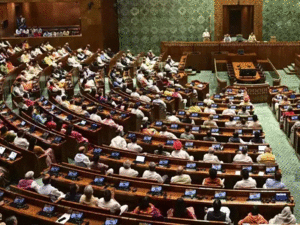Synopsis
In a significant development in the Rajya Sabha, a private member bill proposed by John Brittas of CPI (M) to make Governors act constitutionally on the advice of the Council of Ministers was defeated. The bill aimed to amend Article 158 of the Constitution. The motion was voted down with 56 opposing and 21 supporting it. The treasury benches, particularly BJP members, argued that such a change would undermine the quasi-federal structure of the Indian Constitution. The discussions saw heated exchanges, with opposition MPs accusing Governors in non-BJP states of undermining elected governments. Ultimately, the Deputy Chairman upheld the defeat of the bill after multiple voice votes and a final division.
 Agencies
AgenciesNew Delhi: A private member bill seeking to make Governors constitutionally bound by the advice of the Council of Ministers of states was defeated in the Rajya Sabha on Friday, with treasury benches voting against the Bill brought by Kerala CPI (M) member John Brittas. The two sides clashed at the stage of introduction of the Bill, with the Opposition MPs saying Governors in non-BJP ruled states were acting against the elected governments.
Deputy Chairman Harivansh put the motion for the introduction of the Bill to voice vote and declared it defeated. Brittas, however, insisted on a division.
The motion was rejected with 56 members opposing it and 21 in favour of the introduction.
Brittas sought to introduce The Constitution (Amendment) Bill, 2024 (amendment of article 158) in the afternoon session of the Upper House.
Introducing the bill, he said the legislation seeks to ensure the “constitutional responsibility of Governors towards the Council of Ministers in carrying out their functions by confining their roles strictly within the bounds of the constitutional provisions”.
When Deputy Chairman Harivansh sought approval of the house for the introduction of the Bill through a voice vote, the treasury bench members objected, resulting in an uproar.
Afterwards, Harivansh allowed Brittas to make a brief remark on the Bill.
“The government of India has been harping on cooperative federalism. One important and pertinent issue that is affecting and denting the cooperative federalism and the federal character of the Indian constitution is the role of the Governor,” Brittas said, stressing that his Bill is in line with the spirit of the Constitution, which has been upheld and honoured by the Supreme Court.
He further said there have been enough remarks and observations by different commissions, which emphasised that the Governors should act on the advice of the Council of Ministers.
“What is happening now is that the Governors are unleashed against elected governments,” Brittas alleged.
BJP member Sudhanshu Trivedi said, “Our constitution is considered quasi-federal and the Governor is considered to be representative of the President and if he is asked to abide by the Council of Ministers, then where is the right of the President?”
Harivansh again put the motion for the introduction of the Bill for a voice vote, to which BJP leader Piyush Goyal said the Deputy Chairman had mistakenly said “Ayes have it’ and there would be no need for voting as it had been ‘Noes have it’.
“We have opposed the introduction (of the bill),” Goyal asserted.
After that Harivansh again put the motion to introduce the bill for a voice vote, which the treasury benches vociferously opposed.
Manoj Jha of RJD cited a previous precedent when the Chair ruled in favour of a motion despite more voices against it and asked the Deputy Chairman to respect that ruling. Jairam Ramesh accused Trivedi of misleading the house on the role of the Governor but Harivansh refused further discussion on it.
After putting up the motion to introduce the bill for a voice vote for the fourth time, Harivansh pronounced that ‘Noes have it’, following which the Opposition members protested vociferously.
“If there was any error from the Chair, I have already corrected it,” the Deputy Chairman said.
Brittas, who sought a full discussion on the bill, objected to the pronouncement of the Deputy Chairman and demanded division following which the motion was put to vote.
Finally, after the voting, the motion to introduce The Constitution (Amendment) Bill, 2024 (amendment of article 158), was defeated with 56 votes against and 21 votes in favour.

